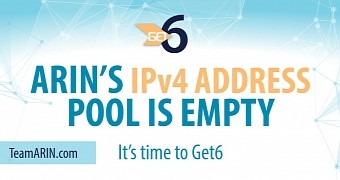ARIN, the American Registry for Internet Numbers, the organization tasked with dispensing IPv4 addresses, has officially announced they ran out of IPv4 addresses.
This announcement affects only North America, and other regions of the globe still have a reserve of IPv4 addresses at their disposal, with the biggest pool belonging to Africa.
ARIN will now focus on transitioning to IPv6 but will continue to assign IPv4 addresses to companies on its waiting list, if new address pools are revoked, returned, or assigned from other parts of the globe.
ARIN is the first NRO (Number Resource Organization) member to reach zero IPv4 addresses, and September 24 will now be the official date when the Internet started moving to IPv6.
This is very unlikely to cause any problems with Internet connectivity since ISPs together with networking hardware makers have been preparing for this moment for ages.
Cisco and Linux-powered devices are the most widely used networking equipment, and both have been sporting built-in IPv6 support for ages. The Linux kernel has been made IPv6 friendly back in 2003.
ISPs have been preparing for this moment
Expecting to be the first to run out of IPv4 address space, American ISPs have been some of the most hard-working companies at implementing IPv6 into their infrastructure, as this Google IPv6 adoption map shows.
What you can expect in the US right now is for ISPs to slowly dish out their last IPv4 addresses, and then slowly shut down small parts of their networks, as they upgrade and reconfigure equipment to work with IPv6, if they haven't yet.
The saddest part in all this is that in the coming future you won't be able to easily memorize IP addresses anymore. While IPv4 looked like this 123.216.178.90, the new IPv6 looks like a jumble of random text, more like a cryptographic key, 2001:db8:0:0:0:ff00:42:8329.

 14 DAY TRIAL //
14 DAY TRIAL //